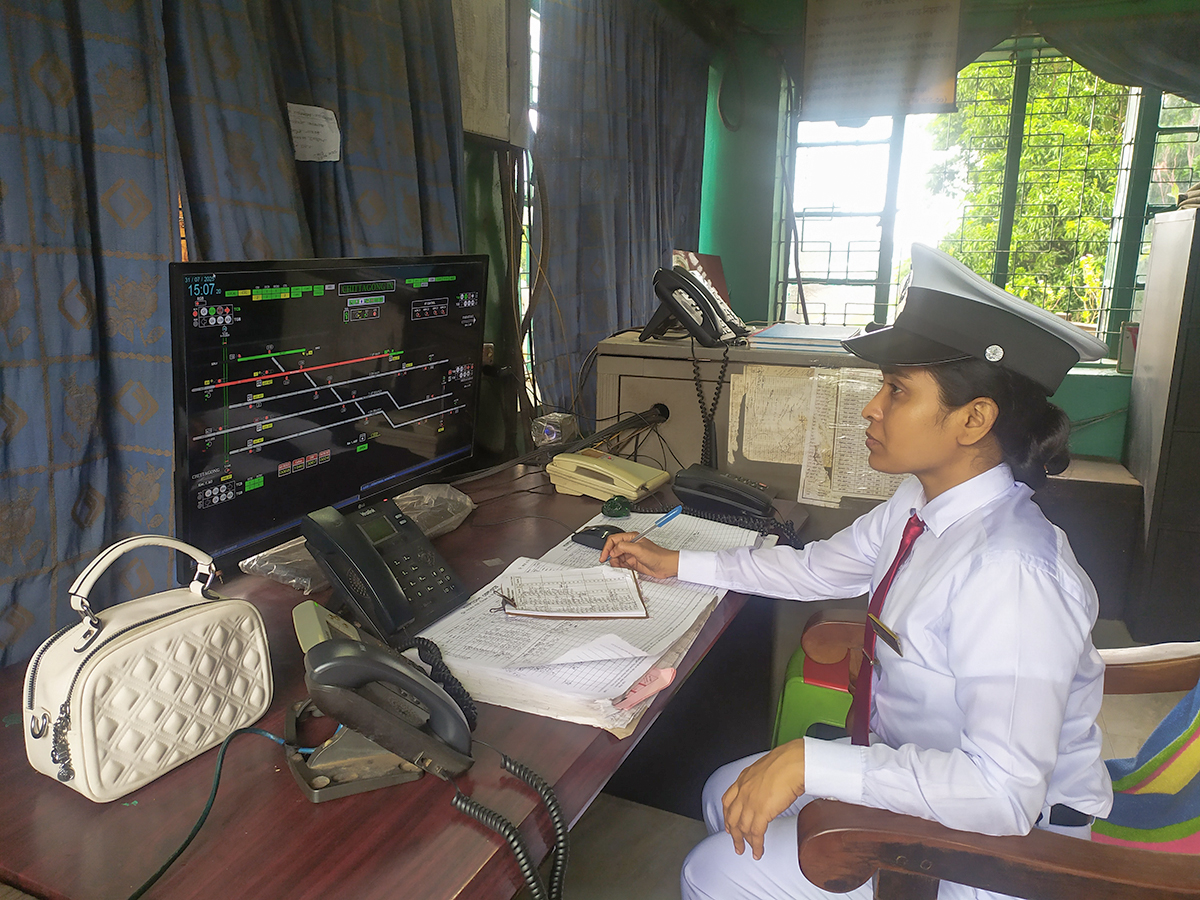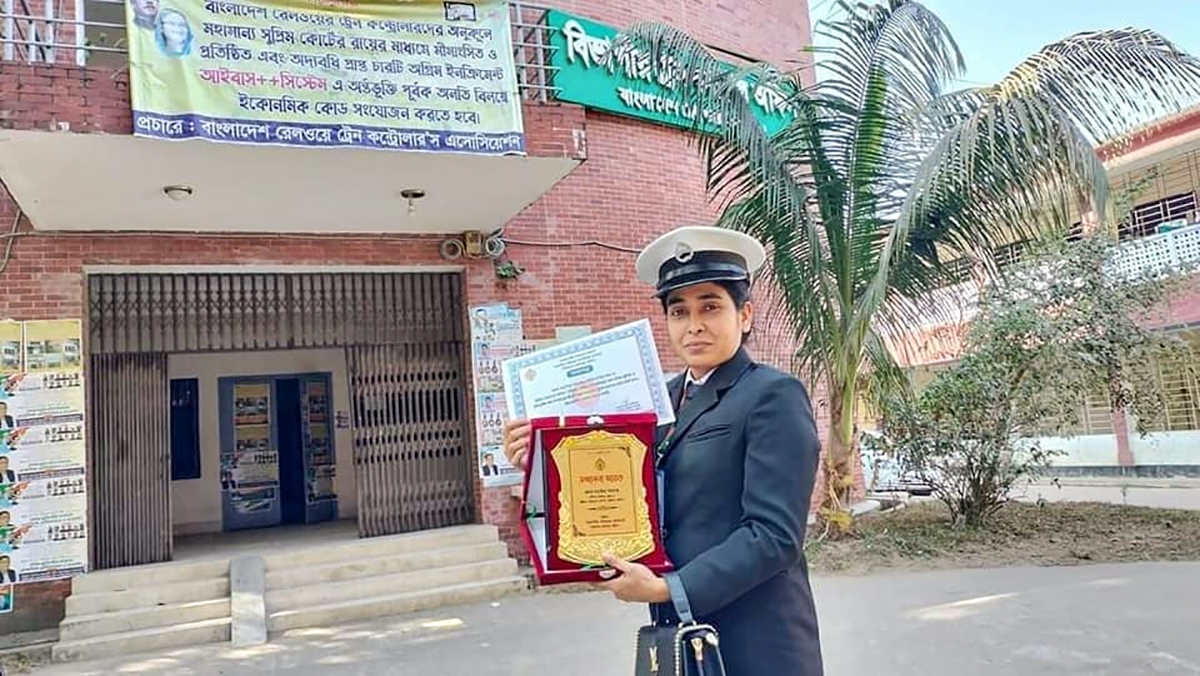
Published :
Updated :

Tanzina Shahnaj has loved two things since her childhood - the rhythm of trains and the tranquillity of solitude. She fondly remembers riding trains to her hometown of Brahmanbaria during Eid or after annual exams, watching birds flying in the sky and farmers working in fields, and humming her favourite songs. These days, as the Chattogram Junction Cabin’s station master (SM), she spends more time controlling train movements than riding them.
Yet, when she travels by train, she remembers the beloved rhyme by Shamsur Rahman - Jhak jhak jhak train choleche, raat dupure oi/Train cholece train cholece, train er bari koi. Her love for trains was shaped by her upbringing as a railwayman’s daughter. Her father Mohammad Abul Kalam Azad started his career as an assistant SM (ASM) and retired as the Chattogram station’s manager in 2019.
“I am filled with anticipation when I ride trains. I love how they slice through the layers of winter fog,” Tanzina told The Financial Express, adding that bus rides give her nausea and dizziness.
She grew up at the Akhaura railway colony near the Titas River and played in the riverside area. The Akhaura Bypass Road rail gate is close to the Bangladesh Railway Government High School, where she studied. Whenever something upset her, she would go and sit quietly by the Titas railway bridge in the afternoon and return home at twilight.
After finishing her higher secondary education, she had to take a break from studies due to illness and taught at a kindergarten for a while. Falling behind her peers filled her with frustration. She later moved to Chattogram and earned her bachelor’s and master’s degrees in political science from Chittagong College.
“During my master’s studies, I also enrolled in the MBA programme at Premier University, hoping to get a bank job. I became very serious about my future and studied hard to make up for the loss caused by the study gap,” she said.
Bangladesh Railway advertised ASM vacancies when she was at university, and a cousin, who is now in Canada, encouraged her to apply. But her father strongly opposed it, saying this job was not suitable for women because of night shifts and safety concerns. He also recalled how he had missed sehri (pre-dawn meal in Ramadan) many times due to the heavy workload during his career.
Besides, Azad questioned her mental strength to handle the multifaceted challenges of the job, insisting she would crack under pressure. Resistance also came from her mother, who supported women’s self-reliance but preferred a teaching job. Yet, Tanzina applied, passed the tests, and got the job.
“A few months later, my master’s and MBA results also came out. I was on a roll. The degrees and the job gave me a new identity. I got out of the abyss I had sunk into a few years ago,” she said.
Having joined the railway in 2016, she trained for four months at the Railway Training Academy in Chattogram’s Halishahar. She learned how to operate the control panel to coordinate train arrivals and departures, assign platforms, and ensure proper signalling; keep records of train movements; communicate with the control centre and nearby stations; and handle emergencies, including accidents. This was followed by on-the-job training.
New recruits start as ASM and progress through SM grade 4, grade 3, grade 2, and grade 1. After grade 1 comes station superintendent, the highest rank in the hierarchy. Tanzina now holds the grade 3 post.
SMs work in three shifts - morning (8am-2pm), evening (2pm-10pm), and night (10pm-8am). If the control panel becomes dysfunctional, they work manually and instruct pointsmen accordingly. The communication among SMs, locomotive masters (LMs), and train guards usually takes place via the control centre.
“I focused on schedule optimisation from the beginning of my job, carefully setting priorities for arriving and departing trains to minimise delays as much as possible. This often required taking calculated risks, and I was also warned by my colleagues. Yet, I trusted my calculations,” she said.
For example, Chattogram is the terminus, and the LM of a train departing from there does not roll immediately after the clearance signal. He often waits for two to three minutes for late passengers to board. Tanzina would utilise this small buffer by signalling an oncoming train to proceed instead of making it wait until the departing one left the station.
Her strategy caught the attention of officials at the Pahartali control office. She not only earned their praise but also trust, which delighted her as she was still not a permanent employee. Instead of becoming complacent, she kept exploring ways to improve optimisation.
She is regarded as diligent and highly professional, which is a reflection of the values she adopted from her father during her childhood. She saw Azad follow the dress code and go to work on time every day. Azad, who remains her idol, would often take her to the workplace, and she would notice how he worked and talked to people.
Her love for the job also fuels her dedication. If she does something that she truly loves, she throws herself into it. As her family instilled meticulousness into her, she also always strives for flawlessness.

Tanzina operates the control panel to coordinate train arrivals and departures, assign platforms, and ensure proper signalling
No part of the job is too difficult for her to handle. There is almost no possibility of making a mistake while operating the control panel because it will not accept a wrong input. However, mistakes may happen while working manually during a system malfunction.
“Digital or manual, this job requires my full concentration. Even a small distraction can lead to a disaster,” she said, adding that she had not made any major mistakes yet.
She sacrificed her sleep while working night shifts for nearly six years. She also had to accept the reality that train stations were not necessarily safe places at night. Yet, nothing bad ever happened to her.
“I have been a bit fearless since my childhood. Moving around the house during power cuts or walking on the street in the darkness would not scare me. In fact, if someone told me there was something frightening in that dark corner, I would become curious to go there,” she said.
Her mother warned her that such curiosity would put her in trouble as a woman, but she did not change. During night shifts, she would often step outside her room and look around, but never saw any paranormal activity. She believes train stations are haunted places only in literature, while the reality is different.
She admitted that she is physically weak but mentally strong, which keeps her going when things get difficult. She sometimes goes to work with mild sickness instead of taking sick leave. She has even carried medicine in her purse to have it at work.
“My colleagues tell me I should not work during illness because trains would not stop running even if I die. I tell them I got sick from working hard, and I will recover by doing the same,” she laughed.
Years of night duty did not take a toll on her health until the 2025 Ramadan, when she started feeling severe back pain. It hurt to sit for 10 minutes at a stretch, and she alternated between standing and sitting positions to get relief, visited the doctor, and took medicine. She had also worked in the standing position before and felt that it increased her concentration.
Though she is satisfied with the improvements in toilets and other facilities for female SMs, she admitted that safety is still a concern. If she had the budget and power, she would take initiatives to ensure their full safety. She feels that women can work long hours in a harassment-free environment.
The founder of the kindergarten, where she worked during her study gap, once visited her in her office and saw her coordinating with multiple parties on the phone. It was a very busy day for her as a special train had been reserved for a political event in the Patiya upazila. She was so busy that she could not even greet him, who later told her father that this job would soon make her insane.
That has not happened yet as multitasking is not difficult for her. She has frequently handled simultaneous communication with gatemen, nearby stations, the control centre, and yard workers. Colleagues have remarked that she works like a robot.
But she stresses that being swift and very serious is her style. For instance, she often contacts the yard to enquire about the status of the rake of a train that is scheduled for departure. She even contacts the locomotive shed and urges them to expedite the engine’s release, though this is not her responsibility.
“I really enjoy my work. My job satisfaction rate is 100 per cent. Sitting in the SM’s room makes me very comfortable,” she said.
While her work has given her pleasure, her competence brought her official recognition from the divisional transportation officer’s (DTO) office in 2023. She and several other employees had earlier been asked to go to the DTO office in uniform, but the reason was not disclosed. Her colleagues thought she would be held accountable for a mistake, but it turned out to be a pleasant surprise.
“I was thrilled that they recognised my active role and sense of responsibility at work. It inspired me to do even better,” she said.
Subarna Express, one of the oldest intercity trains offering non-stop services between Dhaka and Chattogram, is her favourite. She loves the Sylhet route because of tea gardens and lush landscapes. She visited Sylhet for the first time when her father worked there.
“I found an unusual calm at the Sylhet station after disembarking from the Paharika Express in the late afternoon. Flocks of birds were chirping on the roof. It had the vibe of a forest. It is my favourite station,” she said.
She often has unpleasant dreams about trains. For example, she sees head-on collisions and trains heading in the wrong direction during shunting. She often woke from such dreams with a start, and her mother told her she had talked gibberish while sleeping.

Tanzina received official recognition from the divisional transportation officer’s (DTO) office in 2023 for her active role and sense of responsibility at work
Only once in her career did she feel a sudden impulse to resign. She was overwhelmed by endless phone calls that day, and her nerves were at breaking point. But she steadied herself within minutes and resumed work.
She is so absorbed in her work that marriage feels like a distant prospect to her. She does not feel that she has made sacrifices in her personal life to pursue this career. She is very frank about her disinterest in household chores.
Her father recently visited the railway’s east zone headquarters at CRB in Chattogram. During conversations with him, a train guard and several others lauded her. Interestingly, they did not know she was his daughter.
“My father later told me the compliments made him very happy. That day, I felt I had been able to uphold his reputation and prove to him after nine years that women can also excel in this job,” she said.
Her advice for women planning to pursue this career is to be punctual and fully focused. She believes women need opportunities to prove themselves, which they have already done in various fields. Besides, when there will be more female SMs in the future, no one will call this job “unsuitable” for them.


 For all latest news, follow The Financial Express Google News channel.
For all latest news, follow The Financial Express Google News channel.